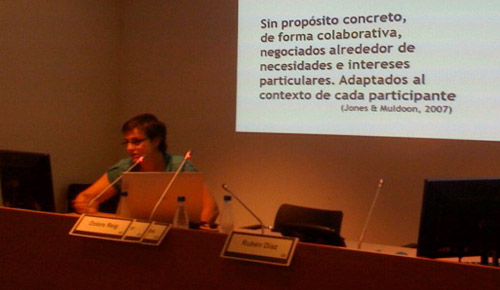Notes from the Working Session on Open Social Learning, organized by UOC UNESCO Chair in E-Learning and held in Barcelona, Spain, on June 30th, 2009. More notes on this event: uocunescoosl.
Open Social Learning in Spain. Clarifying Concepts
Dolors Reig

Dolors Reig. Photo by Carlos Albaladejo
Traditional e-Learning: everything preset, all paths settled. The evolution has then been, from the web to the social web, and from the social web to the personal web (Nova Spivack).
New ideas that shape the social web:
- Intercreativity
- Collective intelligence
- Smart mobs
- Wisdom of the crowds
- Architecture of participation
- Sharism
Open Social Learning
- Digital natives: It’s problable, though, that the so-called digital natives they actually are “hanging out” online (danah boyd). Thus, the digital knowledge might not be that high within digital natives as we should expect.
- Connectivism: the Internet is so shaped to learning because it works as we do, we learn as networks, learning happens when connections are created, the ability to learn is more important than knowing, etc.
- Social learning: if markets are conversations (Cluetrain Manifesto), education and learning are also conversations, the prosumers and active students being the main characters of this era and peer-to-peer being the best way to acquire information and knowledge. From the “I think therefore I am” to the “we participate, therefore we are” (Minds on Fire: Open Education, the Long Tail, and Learning 2.0).
- Informal Learning: Jay Cross states that 70-90% of corporate learning is informal. We have to enable this informal learning so that it can happen.
- e-Learning 2.0
- Generative Learning
- Communities of Learning
- Constructivism
- Edupunk
Creativity: We should be focusing in what motivates people (à la Maslow): that’s why social networking sites are so successful.
Autonomous learning: what really drives knowledge is the process, not the output.
Universal, free and democratic learning (Soumitra Dutta).
Minimally invasive education, taking the example of Sugata Mitra.
Lifelong learning, immersive learning, non-stop learning, ubiquitous learning.
An active role that is required to remix. At its turn, remixing asks for multiliteracies.
Metaverses: Augmented reality, lifelogging, etc.
Changes of roles: the student is not passive, but a participant. The teacher is a facilitator, a curator. And the information becomes a perpetual beta.
Technology becomes too a very important part of the equation: open APIs or all technologies that enable sindication (XML/RSS, Atom, etc.) are true drivers of this change.
Main conclusions
- A web simple to use
- People, collectives, interests, tags, twines, groups
- Real time web
- “If we know the exact cost, the exact agenda of a project, it is probable that it is based on an obsolete technology” (Joseph Gavin, Jr.)
In all this landscape, the e-Portfolio is very relevant, as it perfectly fits with and represents the digital persona. And, complementing to this, e-competences are the necessary tools to get on with digital life.
Q&A
Begoña Gros: We have to make an effort to link the newest technologies and applications with learning or education, and not separating them as if they belonged to different spheres. A: Agreed. Indeed, as we increasingly happen to know more and more uses of the Internet, people shift from “bad” practices (online gambling, porn, etc.) towards “good” practices (learning, communicating with peers, etc.).
Jesús Martínez: Teachers need to learn so that they keep being up-to-date and can keep on teaching. We should accelerate the process of change, of adaptation, or re-learning. A: One of the direst problems is not only that people don’t know, but that people (e.g. teachers) do not know that they do not know.